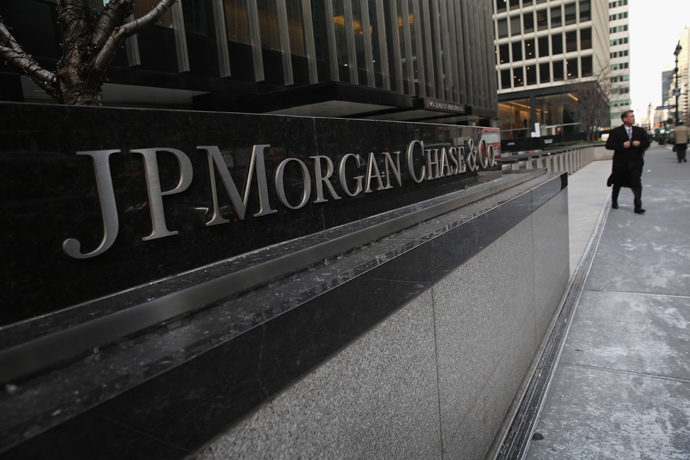Occupy made it possible’: JPMorgan whistleblower Fleischmann to Max Keiser
Alayne Fleischmann, a former lawyer at JPMorgan Chase, whose testimony helped secure a $13 billion fine for the bank, says that most big-time fraudsters have got away scot-free, and claims that only continued public interest can ensure they are punished.
In 2006, Fleischmann worked in a team that repackaged individual home loans as securities. She witnessed a host of violations, including never-to-be-repaid subprime loans being mis-sold as reliable investments, helping to heat the market that sparked the worldwide financial crisis in 2008.
For years, she has been communicating her testimony to investigators, only to see the authorities and other companies strike deals with the rule-breaking giants, meaning that the public never got to hear about the specifics of the rampant infringements at JPMorgan Chase. She did, however, help the RMBS Working Group, a mortgage fraud task force set up in 2012, to extract the biggest fine in banking history - $13 billion (it has since been surpassed by Bank of America's $17 billion fine for similar offenses). But JPMorgan’s chief executive since 2004, Jamie Dimon, has not resigned, and the company itself is in rude health, registering profits of nearly $18 billion last year.
Last week, Fleischmann outed herself to Matt Taibbi, a campaigning journalist at Rolling Stone. The currently unemployed lawyer believes that Dimon and others in the industry can still be made to pay for their evident crimes.
“I think the only reason that we got a task force in the first place is because we got things like Occupy, like Matt Taibbi, who just wouldn’t let it go. Now, it’s a question of doing that again – the media covering it, and people writing to their representatives demanding that they act,” she told RT’s Max Keiser.
“I think Dimon wanted for all of us to go away and for no one to know what happened. Now, I think he is going to a Plan B, which we don’t know what it’s going to be yet.”
After graduating from Cornell Law School and working for top-tier legal firms, the Canadian-born Fleischmann was hired as a transaction manager by the biggest US bank in 2006. Her job was to supervise the quality of the mortgages the bank bought and bundled into securities, which were to be sold to other financial institutions, such as pension funds.
Almost straight away, she noticed things amiss. Her new superior, a diligence specialist, was meant to shine a light on any suspicious mortgage packages – instead he was more focused on leaving no paper trail for a potential prosecution.
“A new diligence supervisor came in, and immediately some of the information started getting blocked off, and he had this policy of no-emails. He wouldn’t send emails and we weren’t allowed to send him emails. If you tried to do it, he would actually come out and yell at you.”
She also became dubious about the quality of the products JPMorgan Chase was selling. A particular issue was with $900 million worth of loans that came in a package from the mortgage company GreenPoint.
Forty percent of the loans appeared to have been made on overstated incomes, including Fleischmann’s most memorable example of a manicurist who claimed to have an income of $117,000 a year – more than five times the national average.
According to the interviews Fleischmann gave to Taibbi, who himself spoke with Thom Hartmann on RT’s ‘The Big Picture’earlier this week, the sales team began to pressure her and others into concealing the overstated incomes, and the risks that went with them. Once the amount of officially designated overstated income loans went below 10 percent, JPMorgan Chase sold the bundle, but not as risky sub-prime loans. Both re-categorizing the loan type and hiding the true incomes of the mortgage owners are criminal offenses, and the securities lost their new owners hundreds of millions of dollars once the market collapsed in 2008.
As a result of JP Morgan’s decision to sell these loans despite knowing they were defective, Taibbi said Americans suffered dramatically.
“Everyone who bought them experienced massive losses,” he told Thom Hartmann.“What a lot of people don’t understand in the financial crisis is that if you have a pension, or you were involved in a mutual fund or your state’s retirement fund was invested in mortgage backed securities, you probably woke up at some point in late 2008 and noticed that 30 to 40 percent of that fund had disappeared. In large part, this was because banks like Chase and other companies were selling these defective products to investors, and they were experiencing massive defaults and massive losses."
In 2010, Dimon told investigating US lawmakers that "somehow we just missed, you know, that home prices don't go up forever."
Fleischmann, who herself wrote warning letters to her bosses before her redundancy in 2008, does not believe that for a second, noting that JPMorgan Chase sold its own subprime mortgages back in 2006, after concluding – in Dimon’s own words – “that underwriting standards were deteriorating across the industry."
“The thing I find amazing is that you have these people who are earning millions of dollars per year because they have this incredibly knowledge, can then turn around and say that they didn’t understand the products they were selling, or how the housing market works, and that they couldn’t understand it even after repeated internal warnings,” says Fleischmann.
“The thing I find amazing is that you have these people who are earning millions of dollars per year because they have this incredibly knowledge, can then turn around and say that they didn’t understand the products they were selling, or how the housing market works, and that they couldn’t understand it even after repeated internal warnings,” says Fleischmann.
She also rejects the implication that the ultimate purchasers of the loans are responsible for taking the risks.
“You are just putting these packages together, putting a big stamp on them, saying “We’ve looked at these, these are good quality, we’ve told you everything about them…” So it was basically “Trust us,” and then when it all went bust it was: “It’s your fault for trusting us.”
But perhaps more astonishing than the violations themselves are the lengths to which JPMorgan Chase has gone to avoid their violations from going public in subsequent years – perhaps another hint that the Dimon and others knew exactly what was happening.
There was not only the deal that allowed JPMorgan Chase to get away basically unchanged with a fine and a vague statement, which it said was not an admission of guilt. A lawsuit from Federal Home Loan Bank was also settled after it demanded that Fleischmann’s name be revealed.
Fleischmann said that investigators were often focused on specific violations – not necessarily the most severe ones, but ones that could be easily proven – and these would be used as a form of exemplary justice, a symbolic slap on the wrist. These did not compensate all those who lost out or seriously impede the culprits.
As the statute of limitations has run out for most of the crimes she witnessed, Fleischmann, who will return to work in Canada, would still like to see convictions for wire fraud – which can be carried out for up to a decade after the event. But for all of her hope, she doubts there is a sufficient appetite for justice from the US legal system.
"That's the thing I'm worried about. That they make the whole thing disappear. If they do that, the truth will never come out," she told Rolling Stone.


